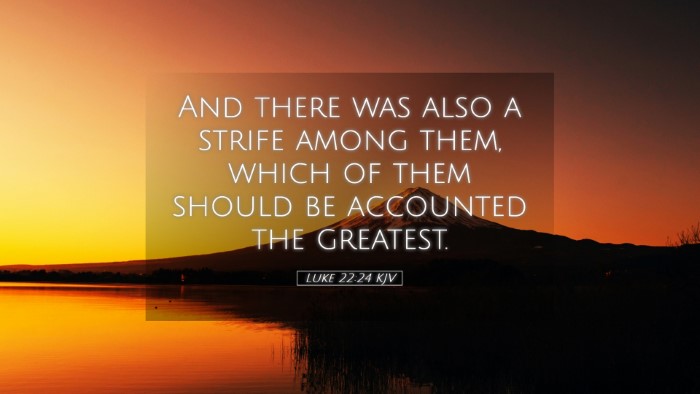Commentary on Luke 22:24
In the passage of Luke 22:24, we find a poignant moment in the life of Jesus and His disciples. This verse reads:
"And there was a strife among them, which of them should be accounted the greatest."
Contextual Overview
This scene unfolds during the Last Supper, where Jesus prepares to institute the Lord's Supper and foreshadows His impending suffering and crucifixion. The disciples, however, distract themselves with a dispute concerning their status among one another.
The Nature of the Dispute
Beneath the surface, this argument reveals a fundamental struggle for power and recognition. As Matthew Henry, a prominent commentator, insightfully notes:
"The disciples were so far from having the principles of humility and self-denial, that they fell into a strife about superiority."
Here, we see that the human inclination towards pride and ambition is especially evident in spiritual contexts.
Importance of Humility
Albert Barnes comments on the essential quality of humility in leadership, asserting:
"True greatness in the kingdom of God is measured by humility and service rather than status and power."
This shift in understanding—where the greatest is not the one who commands but the one who serves—is pivotal for both personal and ecclesiastical life.
Jesus’ Response and Teaching
In subsequent verses (notably verse 26), Jesus articulates the upside-down nature of greatness in His kingdom:
"But ye shall not be so: but he that is greatest among you, let him be as the younger; and he that is chief, as he that doth serve."
Adam Clarke elaborates on this principle, emphasizing the radical nature of Jesus’ teaching:
"Christ turns the worldly wisdom of seeking authority on its head; in His kingdom, the leader must take on the role of a servant."
Theological Implications
This episode has profound theological implications. The strife among the disciples symbolizes humanity's inherent tendency to seek after self-exaltation—a theme echoed throughout scripture. Paul, in Philippians 2:3, reinforces this with the exhortation:
"Let nothing be done through strife or vainglory; but in lowliness of mind let each esteem other better than themselves."
Applications for Pastors and Leaders
For pastors and church leaders, this passage serves as a reminder to embrace servanthood over supremacy. The calling to lead is a calling to serve, a truth that resonates strongly in contemporary discussions about church leadership.
- Modeling Humility: Leaders should exemplify humility in their ministry, serving their congregation rather than seeking personal glory.
- Encouraging Team Dynamics: Emphasize collaboration over competition within church leadership structures.
- Promoting a Culture of Service: Foster environments where every member feels they can contribute significantly to the body of Christ.
Conclusion
Luke 22:24 serves as both a historical record and an enduring lesson about the true nature of greatness in the Kingdom of God. The disciples' dispute highlights the ever-present temptation to seek self at the expense of others, while Jesus' corrective teaching challenges us to embrace an ethos of humility and service.
In summary, as students, scholars, and leaders reflect on this rich text, it invites a re-examination of values and practices concerning leadership, community, and discipleship within contemporary Christian life.


